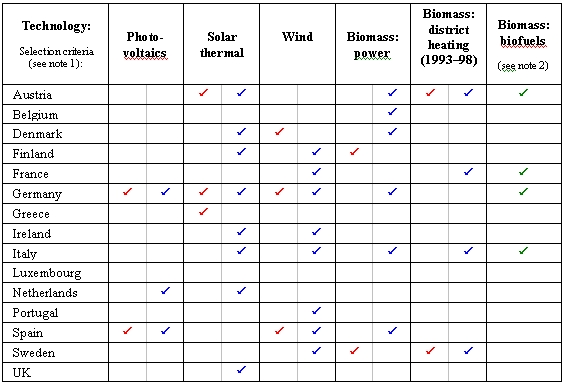Copenhagen, 6 December 2001
Why has wind energy grown faster in Germany than Britain, and energy
from solar panels expanded more quickly in Spain than Greece?
A new report from the European Environment Agency identifies factors
that can influence the success or otherwise of renewable energy
projects.
Renewable energies: success stories aims to facilitate
greater use of renewable energy sources and contribute to efforts by
the European Union and its Member States to meet targets for increasing
power from renewables by 2010.
The report focuses on how much each EU country managed to expand its
use between 1993 and 1999 of a number of renewable energy technologies
- solar photovoltaic panels, solar thermal heating, wind and certain
uses of biomass (wood and crops).
The study identifies essential elements for success in seven areas:
political, legislative, fiscal, financial and administrative support,
technological development, and information, education and training. It
concludes that the key to success lies in the combined effect of
support measures rather than in any single factor. The winning
combinations vary from one technology to another.
The success stories include the expansion of solar thermal energy
and biomass-fuelled district heating in Austria, wind energy and
biomass power in Denmark, photovoltaics, solar thermal and wind energy
in Germany, photovoltaics and wind energy in Spain and biomass district
heating in Sweden.
"This report helps point the way towards solutions. It demonstrates
the European Environment Agency's determination not only to provide
information to support better policy-making but also to gather and
disseminate ‘best practice' information for actors on the ground to
use," said EEA Executive Director Domingo Jiménez-Beltrán.
"The study also creates a framework that can be used by others to
promote renewables and communicate about success stories,” Mr
Jiménez-Beltrán added. "I hope it will become the seed for the creation
of a clearing house for experiences in how best to promote renewable
energies at many levels, from national to local.”
The report was launched at the European Parliament in Brussels
yesterday at a meeting of the European Forum for Renewable Energy
Sources (EUROFORES) and the European Renewable Energy Council
(EREC).
The study and the executive summary can be downloaded from the EEA
website at
http://reports.eea.europa.eu/environmental_issue_report_2001_27/en/
Notes to editors
- The EU has set itself an indicative target of producing 12% of its
energy (both electricity and heat) and 22.1% of its electricity from
renewable sources by 2010. Indicative national renewable electricity
targets for each Member State are also included in the recently adopted
EU renewable electricity Directive (2001/77/EC).
- In the study, to be considered a success the use of a renewable
energy technology in a specific Member State had to show at least one
of the following:
- An absolute increase equivalent to at least 10% of the total
EU-wide increase in output of that technology over the 1993-1999
period
- A percentage increase in output higher than the EU average increase
for that technology over the 1993-1999 period.
The countries and technologies meeting one or both of these criteria
are shown in the table in the Annex.
About the EEA
The European Environment Agency aims to support sustainable
development and to help achieve significant and measurable improvement
in Europe's environment through the provision of timely, targeted,
relevant and reliable information to policy making agents and the
public. Established by the European Union (EU) in 1990 by Council
Regulation 1210/90 (subsequently amended by Council Regulation
933/1999), the Agency is the hub of the European environment
information and observation network (EIONET), a network of some 600
environmental bodies and institutes across Europe.
Located in Copenhagen and operational since 1994, the EEA is open to
all countries that share its objectives and are able to participate in
its activities. The Agency currently has 24 member countries. These are
the 15 EU Member States; Iceland, Norway and Liechtenstein, which are
members of the European Free Trade Association (EFTA); and, since 1
August 2001, six of the 13 countries in central and eastern Europe and
the Mediterranean area that are seeking accession to the EU --
Bulgaria, Cyprus, Latvia, Malta, Slovenia and the Slovak Republic.
Their membership makes the EEA the first EU body to take in the
candidate countries.
In recent weeks Estonia, Hungary, Lithuania, Romania and the Czech
Republic have also ratified EEA membership agreements and it is
anticipated that the remaining two candidate countries -- Poland and
Turkey -- will do so over the next few months. This will take the
Agency's membership to a total of 31 countries.
Annex
Trends in renewable energy expansion 1993--99

Biomass district heating refers to heat output from heat plants
only.
Note 1: Two criteria for selection are used:
 (left) represents a
contribution of at least 10 % of the total EU increase in absolute
terms, 1993--99;
(left) represents a
contribution of at least 10 % of the total EU increase in absolute
terms, 1993--99;
 (right) represents
a percentage increase greater than the EU percentage increase,
1993--99.
(right) represents
a percentage increase greater than the EU percentage increase,
1993--99.
Note 2: Biofuels only:
 represents those
Member States which indicate that they use biofuels (most do
not).
represents those
Member States which indicate that they use biofuels (most do
not).
Source: Eurostat.
[top]


Document Actions
Share with others